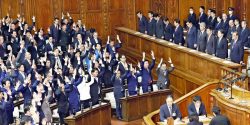- Yomiuri Editorial
- Intensifying EV competition
Help Japan’s automanufacturers catch up in development, sales
12:14 JST, May 11, 2022
Competition in the electric vehicle market is intensifying around the world. It is vital for Japanese manufacturers, which have lagged conspicuously behind their rivals overseas, to further strengthen their development and sales strategies to enhance their competitiveness.
Honda Motor Co. announced in April that it would spend ¥5 trillion over the next 10 years to develop EVs and their software. The automaker intends to start selling 30 EV models by 2030. It also plans to establish a joint venture with Sony Group Corp. and market a jointly developed electric vehicle model in 2025.
Toyota Motor Corp. has unveiled its first dedicated EV for the luxury Lexus brand. Toyota plans to make all of its Lexus vehicles EVs in 2035 and is trying to quickly establish Toyota’s brand in this field.
Mercedes-Benz Group AG of Germany, Volvo Car Group of Sweden and other European manufacturers have already announced shifts to EV production one after another. In China, a low-price EV for around ¥500,000 is reportedly very popular. Electric vehicles are rapidly being adopted around the world.
Japanese automakers have an established reputation for their high performance in gasoline-powered vehicles. They need to maintain this in electric vehicles as well and steadily increase their EV sales.
Global EV sales grew to about 4.6 million units in 2021, more than double the previous year. At present, Japanese manufacturers are in an inferior position.
U.S. firm Tesla Inc., the world’s No. 1 electric carmaker, sold about 1 million EVs in 2021, compared with 260,000 units for the Renault Nissan Mitsubishi Alliance, the highest among Japanese automakers, and less than 20,000 units each for Toyota and Honda.
These poor sales by Japanese automakers may be partly due to sluggish growth in the domestic market. In 2021, EVs accounted for nearly 10% of new vehicle sales in China and Europe, but less than 1% in Japan.
Each country is tightening regulations on gasoline-powered cars that emit carbon dioxide and supporting the spread of EVs with subsidies and tax cuts. The Japanese government also needs to help expand the domestic market by improving subsidies and tax breaks, as well as promoting the installation of charging infrastructure.
Given that, it is important for companies to make efforts to lower the prices of EVs through cost reductions as a result of mass production. It is also desirable to expand attempts to create attractive vehicles through such measures as cooperation between different industries, as seen in a joint effort by Honda and Sony.
It is also essential to accelerate the technological development of batteries, a key component for EVs. Japan reportedly has taken the lead in developing a next-generation all-solid-state battery with a long cruising distance and excellent safety. This battery must be swiftly put into practical use.
However, the spread of EVs means the number of parts required will be drastically lower than with gasoline-powered vehicles, which has led to concerns about the adverse effect on parts manufacturers’ financial situation and their hiring. The government should pay attention to trends in the parts industry and make efforts to provide support for companies to adjust their operations and other purposes.
(From The Yomiuri Shimbun, May 11, 2022)
Top Articles in Editorial & Columns
-

40 Million Foreign Visitors to Japan: Urgent Measures Should Be Implemented to Tackle Overtourism
-

University of Tokyo Professor Arrested: Serious Lack of Ethical Sense, Failure of Institutional Governance
-

Policy Measures on Foreign Nationals: How Should Stricter Regulations and Coexistence Be Balanced?
-

China Provoked Takaichi into Risky Move of Dissolving House of Representatives, But It’s a Gamble She Just Might Win
-

PM Takaichi Should Help Young Japanese Break Seniority Barrier to Vitalize Politics
JN ACCESS RANKING
-

Japan Institute to Use Domestic Commercial Optical Lattice Clock to Set Japan Standard Time
-

Israeli Ambassador to Japan Speaks about Japan’s Role in the Reconstruction of Gaza
-

Man Infected with Measles May Have Come in Contact with Many People in Tokyo, Went to Store, Restaurant Around When Symptoms Emerged
-

Prudential Life Insurance Plans to Fully Compensate for Damages Caused by Fraudulent Actions Without Waiting for Third-Party Committee Review
-

Woman with Measles Visited Hospital in Tokyo Multiple Times Before Being Diagnosed with Disease



















